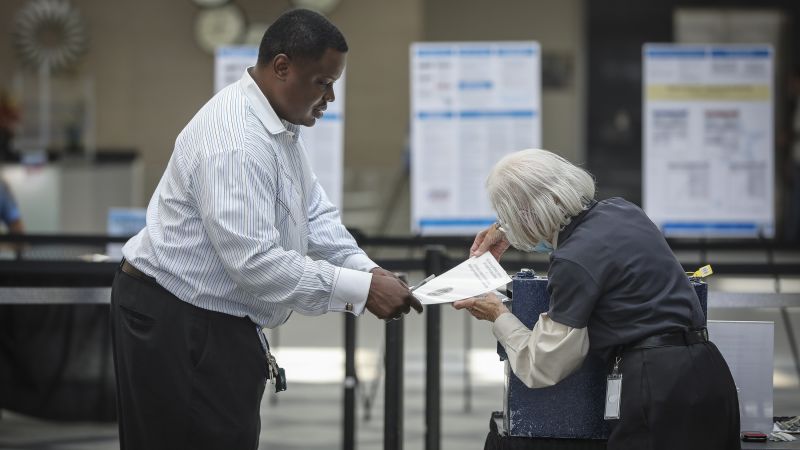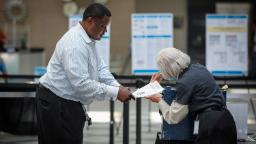

CNN
—
In Douglasville, Georgia – just west of Atlanta – a new buzzer-entry system secures the doors of the Douglas County election office. And elections director Milton Kidd said he now varies the times and the routes he uses to travel to work – all to evade the attention of election conspiracy theorists who have targeted the office.
In Madison, Wisconsin, where a top election official faced death threats in the aftermath of the 2020 election, officials have redesigned the city clerk’s office, adding cameras, locking doors and covering the windows with white paper, said city attorney Michael Haas. In addition, a new city ordinance establishes a fine of up to $1,000 for disorderly conduct directed at election officials.
In Colorado, meanwhile, a new state law – the Vote Without Fear Act – prohibits carrying firearms at polling places or within 100 feet of a ballot drop box. And in Tallahassee, Florida, officials have added Kevlar and bullet-resistant acrylic shields to the Leon County elections office, said Mark Earley, who runs elections in the county.
With Election Day less than a month away – and early voting already happening in some states – the officials charged with administering the midterms are racing to boost security for their staff, polling places and voters, as baseless conspiracy theories about fraud continue to swirl around the 2020 election and the one now underway.
As CNN recently reported, the concerns about threats and harassment are so great that federal officials are now offering de-escalation training to local and state officials to help avert violence at the polls.
“We certainly are in territory that we have not navigated in the past,” said Tina Barton, a former election official in Michigan who sits on the Committee for Safe and Secure Elections. It’s a bipartisan group of election experts and law enforcement officials, working to prevent threats against voters and election officials.
“I’m sad about the fact that it took a scenario like this for us to have to look at all of these things and say, ‘How do we keep ourselves safe?’” she added of the threats that started after the 2020 election. “But we’re seeing unprecedented threats and harassment.”
Barton said election officials are deploying a bevy of tactics to secure the elections – from installing cameras and lighting at drop boxes to adding GPS and other tracking devices to ballot bags to monitor their movement on Election Day.
Election officials in North Carolina last week issued what they described as their “most comprehensive” guidance to local elections officials for maintaining order at polling places this fall. It reinforces that it’s a crime to interfere with voter or election workers. The North Carolina State Board of Elections has also developed a guide for local law enforcement to help officers identify and respond to voter intimidation.
In Leon County, Florida, Earley said his staff has received active-shooter training as part of their preparations in recent election cycles. But he said it has taken on “more significance since January 6,” referring to the 2021 attack on the US Capitol.
The extra steps to secure the building and protect the staff, Earley said, have sprung from worries about “people buying into myths and disinformation and feeling it’s their patriotic duty to take action.”
“In today’s world, that action, unfortunately, oftentimes comes with firearms,” he added.
In Oregon, meanwhile, the secretary of state’s office is urging local election officials to install signs outside ballot boxes that spell out voters’ rights and warn that voter intimidation violates the law – following social media references to activists targeting the boxes, said Ben Morris, a spokesman for the office.
The state mails a ballot to every voter, which Oregonians return either by mail or by depositing into drop boxes. About 200 drop boxes are used around the state.
In neighboring Washington state, officials in the Seattle area found and removed some 11 signs that had been posted by an “election integrity” activist and that warned that drop boxes were “under surveillance” ahead of the August 2 primary. King County officials called the signs an example of voter intimidation.
(Amber Krabach, the activist who erected the signs, has sued King County and state officials in federal court, arguing that removing the signs violated her First Amendment right to free speech.)
King County election officials are not aware of any security issues with their 76 ballot drop boxes right now, said Kendall Hodson, the county election office’s chief of staff, but “given what happened in the primary, we are keeping our eyes peeled for any unusual behavior.”
Back in Douglas County, Georgia – a community of roughly 145,000 people that backed President Joe Biden in 2020 – Kidd said he’s dismayed and discouraged by what he and his staff have endured.
Activists have trailed workers and photographed their license plates. In the 2020 election, people claiming election fraud dug through the trash at one polling location, found destroyed sample ballots and accused officials of throwing out votes, he said.
And this year, he’s had several companies refuse to rent the trucks to the county that it needs to transport equipment to precincts.
“In this climate, any business that’s associated with elections becomes a target,” he said. (Kidd has secured the trucks but said he doesn’t want to name the supplier for fear of further trouble.)
Kidd, who has worked in the county’s election system for seven years, said he’s lost much of his once-stable workforce of temporary poll workers as a result of all the harassment and stress.
“We’re able do things at the precinct” to protect workers, he said. “But we’re not able to go home with you. We’re not able to be with you in the grocery store.”
“The level of depression, the level of anxiety that is now present in election administration is ridiculous,” he added. “And I don’t know, personally myself, how much longer I am going to do this.”
